Human Animal Bond Research Institute Transforms Beloved Pet Night on Capitol Hill Reception to Week of Virtual Programming Focused on the Positive Role of Pets
Washington, D.C. (September 14, 2020) — The Human Animal Bond Research Institute (HABRI) virtually delivered the message that pets are good for our health and wellbeing through Pet Week on Capitol Hill. Pet Week featured conversations with pet care leaders and members of Congress about the importance of pet ownership in America and the scientific evidence that shows how pets and people are good for each other.
“HABRI is proud to host Pet Night on Capitol Hill, but since we couldn’t be together in person, we decided to build a virtual Pet Week on Capitol Hill,” said Steven Feldman, HABRI’s Executive Director. “The entire pet care community came together to share the power of pets with Congress, and we ended up with even greater participation, which shows how the human-animal bond has grown even stronger during the pandemic.”
Pet Week highlighted timely issues including the COVID-19 pandemic’s impact on pet adoption in America and the importance of passing lifesaving pet-related legislation aimed at improving the lives of veterans with PTSD and survivors of domestic violence.
Congressman Kurt Schrader (OR-5) discussed the importance of One Health Act legislation aimed at helping protect people and pets from zoonotic diseases, and the key role of veterinary medicine in preventing future pandemics.
Thousands of participants experienced the human-animal bond from afar, with virtual visits from Pet Partners therapy animals and adoptable pets from the Humane Rescue Alliance. Pet Week also featured a special guest appearance from baseball Hall-of-Famer Tony La Russa, who spoke on the lifesaving impact of service dogs for veterans with post-traumatic stress.
For Pet Week’s closing celebration, the Animal Health Institute crowned the winners of the Cutest Pets on Capitol Hill contest, recognizing the most adorable congressional companions from both sides of the aisle.
Dog: Sergeant Pepper
Owner: Syd Terry
Office of Rep. Jan Schakowsky (IL-9)
Cat: Jackson
Owner: Liz Leibowitz
Office of Senator Cardin (MD)
Exotic: Arty
Owner: Matthew Brownlee
Office of Rep. Markwayne Mullin (OK-2)
“As one of the three veterinarians in the United States Congress, it’s always a lot of fun to collaborate with the Animal Health Institute for the Cutest Pets on Capitol Hill contest,” said Representative Schrader. “Pets are always important to us, and never more so than during the global pandemic when so many of us seek companionship and outlets that help us have fun and release tension. Pets remind us of what’s good and right in the world.”
All recorded discussions from Pet Week on Capitol Hill are now available to view on-demand at www.PetNight.com, where people can also sign up to be invited to Pet Night 2021. Pet Night on Capitol Hill is an annual event, hosted by HABRI and sponsored by the pet care community. For more information, please visit www.petnight.com. Images available upon request.
About Human Animal Bond Research Institute
The Human Animal Bond Research Institute (HABRI) is a not-for-profit organization that maintains the world’s largest online library of human-animal bond research and information; funds innovative research projects to scientifically document the health benefits of companion animals, and informs the public about human-animal bond research and the beneficial role of companion animals in society. For more information, please visit www.habri.org.
Contact
Jamie Baxter
jamie@theimpetusagency.com
775.322.4022
###





